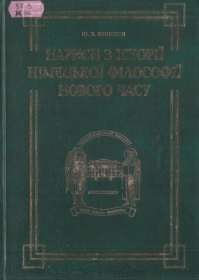Essays on the History of Modern German Philosophy: Kyiv, Tsentr navchalnoyi literatury, 2006, 572 p.
Keywords:
Textbook, German idealismSynopsis
The textbook highlights the key features of the doctrines of German philosophers of the Modern period. In particular, the philosophical system of Leibniz, the philosophy of law and philosophy of religion of Kant, Fichte's ethics, the philosophy of nature and aesthetic dialectic of Schelling, the doctrine of ‘removal’ in the historical and philosophical process, the dialogical nature of philosophical truth of Feuerbach, etc. are analysed in detail. Particular attention is paid to the problem of the internal unity of the philosopher's personality and his doctrine. Kushakov refutes a number of stereotypes that were widespread in Soviet times in assessing the ideas of German philosophers. The ambitious goal of the author of the textbook is not only to describe the philosophical systems of thinkers, which is typical for publications of this type, but also to attempt to reactualise the key ideas of these philosophies.
CONTENTS
Preface
Introduction. Peculiarities of the German philosophical spirit
Part I. Philosophy of the Enlightenment
Essay 1. Gottfried Leibniz
Essay 2: Christian Wolff
Part II. German classical philosophy
Essay 1. The concept of ‘German classical philosophy’
Historical significance
Social and historical background of the formation
Sources of ideas
Unity and contradiction
Essay 2: Immanuel Kant
Man and thinker
The ‘pre-critical’ period
The system of ‘critical idealism’
Revolution in philosophy
Theory of knowledge
Practical philosophy
Applied practical philosophy
§ 1. Philosophy of religion
§ 2. Philosophy of Law
§ 3. Philosophy of history
Critique of Judgment (aesthetics and teleology)
The idea of the history of philosophy as a science
Some conclusions
Appendix. The concept of ‘thing in itself’
Essay 3: Johann Gottlieb Fichte (Genesis of the doctrine and difficulties and misconceptions in its understanding)
From Kant to Fichte
§ 1. Carl Leonhard Reinhold – systematiser and populariser of Kantian philosophy. ‘Elementary Philosophy’
§ 2. Gottlob Ernst Schulze's ‘New Scepticism’
§ 3. ‘Critical scepticism’ by Salomon Maimon
§ 4. ‘The Doctrine of the Point of View by Jakob Sigismund Beck
The personality of Fichte
Fichte's epoch
The initial intuition. The tasks of philosophy
Essay 4. Friedrich Wilhelm Joseph Schelling
Natural philosophy
Is a philosophy of nature possible today?
Dialectic as a logical and aesthetic phenomenon
Essay 5. Georg Wilhelm Friedrich Hegel
The source and mystery of Hegel's philosophy. ‘Phenomenology of Spirit’
On the criticism of Hegel's methodology (Application of dialectic as a problem)
On the critique of Hegel's conception of the relation between philosophy and history of philosophy
Essay 6. Ludwig Feuerbach
Wozu Ludwig Feuerbach?
Feuerbach as a historian of philosophy:
§ 1. The theory of the historical and philosophical process
§ 2. Methodology of historical and philosophical research
§ 3. Analysis of the philosophical doctrines of Descartes and Spinoza
§ 4. Presentation, development and criticism of Leibniz's philosophy
Appendix. Feuerbach
Essay 7. Karl Marx and the end of classical German philosophy
Methodological principles of analysis and evaluation of Marx's worldview
The personality of Marx
The contradictions of the worldview
Part III. Lev Shestov and the ‘’after‘’ of classical German philosophy
Essay 1. Contrasts of thinking: Aristotle, Hegel and Shestov
Essay 2. The historical and philosophical project of Lev Shestov. Historian of philosophy or ‘Fan of spiritual hooliganism’?
Lessons from L. Shestov
Appendix. Historical and philosophical projects of the XX century: results, problems, prospects
Afterword
Downloads




